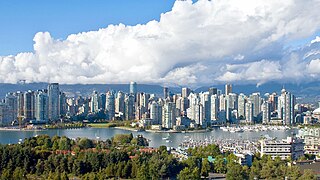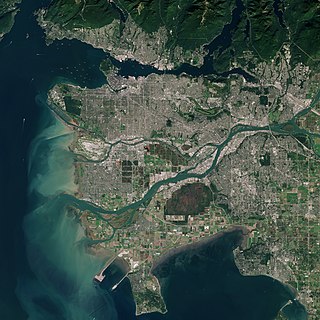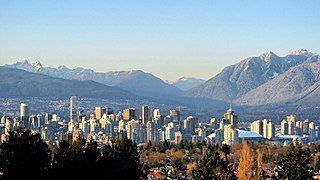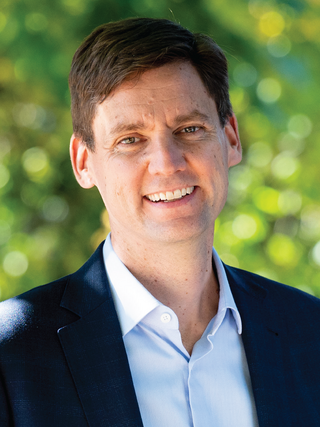
British Columbia is the westernmost province of Canada. Situated between the Pacific Ocean and the Rocky Mountains, the province has a diverse geography, with rugged landscapes that include rocky coastlines, sandy beaches, forests, lakes, mountains, inland deserts and grassy plains. British Columbia borders the province of Alberta to the east; the territories of Yukon and Northwest Territories to the north; the U.S. states of Washington, Idaho and Montana to the south, and Alaska to the northwest. With an estimated population of over 5.6 million as of 2024, it is Canada's third-most populous province. The capital of British Columbia is Victoria, while the province's largest city is Vancouver. Vancouver and its suburbs together make up the third-largest metropolitan area in Canada, with the 2021 census recording 2.6 million people in Metro Vancouver.

The Lower Mainland is a geographic and cultural region of the mainland coast of British Columbia that generally comprises the regional districts of Metro Vancouver and the Fraser Valley. Home to approximately 3.05 million people as of the 2021 Canadian census, the Lower Mainland contains sixteen of the province's 30 most populous municipalities and approximately 60% of the province's total population.

Victoria is the capital city of the Canadian province of British Columbia, on the southern tip of Vancouver Island off Canada's Pacific coast. The city has a population of 91,867, and the Greater Victoria area has a population of 397,237. The city of Victoria is the seventh most densely populated city in Canada with 4,406 inhabitants per square kilometre (11,410/sq mi).

Vancouver is a major city in western Canada, located in the Lower Mainland region of British Columbia. As the most populous city in the province, the 2021 Canadian census recorded 662,248 people in the city, up from 631,486 in 2016. The Metro Vancouver area had a population of 2.6 million in 2021, making it the third-largest metropolitan area in Canada. Greater Vancouver, along with the Fraser Valley, comprises the Lower Mainland with a regional population of over 3 million. Vancouver has the highest population density in Canada, with over 5,700 people per square kilometre, and fourth highest in North America.

Richmond is a city in the coastal Lower Mainland region of British Columbia, Canada. Mainly a suburban city, it occupies almost the entirety of Lulu Island, between the two estuarine distributaries of the Fraser River. Encompassing the adjacent Sea Island and several other smaller islands and uninhabited islets to its north and south, the suburb neighbours Vancouver and Burnaby on the Burrard Peninsula to the north, New Westminster and Annacis Island to the east, Delta to the south, and the Strait of Georgia to the west.

Surrey is a city in British Columbia, Canada. It is located south of the Fraser River on the Canada–United States border. It is a member municipality of the Metro Vancouver regional district and metropolitan area. Mainly a suburban city, Surrey is the province's second-largest by population after Vancouver and the third-largest by area after Abbotsford and Prince George. Seven neighbourhoods in Surrey are designated town centres: Cloverdale, Fleetwood, Guildford, Newton, South Surrey, and City Centre encompassed by Whalley.

Prince George is a city in British Columbia, Canada, situated at the confluence of the Fraser and Nechako rivers. The city itself has a population of 76,708; the metro census agglomeration has a population of 89,490. It is often called the province's "northern capital". because it serves as a centre for higher education, health care, government services, arts and entertainment, sports, and support for major industries such as forest products and mining.

Abbotsford is a city in British Columbia next to the Canada–United States border, Greater Vancouver and the Fraser River. With a census population of 153,569 people (2021), it is the largest municipality in the province outside metropolitan Vancouver. Abbotsford–Mission has the third-highest proportion of visible minorities among census metropolitan areas in Canada, after the Greater Toronto Area and the Greater Vancouver CMA. It is home to Tradex, the University of the Fraser Valley, and Abbotsford International Airport.

The Metro Vancouver Regional District (MVRD), or simply Metro Vancouver, is a Canadian political subdivision and corporate entity representing the metropolitan area of Greater Vancouver, designated by provincial legislation as one of the 28 regional districts in British Columbia. The organization was known as the Regional District of Fraser–Burrard for nearly one year upon incorporating in 1967, and as the Greater Vancouver Regional District (GVRD) from 1968 to 2017.

Greater Vancouver, also known as Metro Vancouver, is the metropolitan area with its major urban centre being the city of Vancouver, British Columbia, Canada. The term "Greater Vancouver" describes an area that is roughly coterminous with the region governed by the Metro Vancouver Regional District (MVRD), though it predates the 1966 creation of the regional district. It is often used to include areas beyond the boundaries of the regional district but does not generally include wilderness and agricultural areas that are included within the MVRD.

Sam Sullivan is a Canadian politician who served as the MLA for Vancouver-False Creek. Previously, he served as the Minister of Communities, Sport, and Cultural Development with responsibility for Translink in the short-lived BC Liberal government after the 2017 election, as well as the 38th mayor of Vancouver, British Columbia, Canada, and has been invested as a member of the Order of Canada. He is currently President of the Global Civic Policy Society and an adjunct professor at the UBC School of Architecture and Landscape Architecture.

George Chow is a Canadian politician. He was elected to the Legislative Assembly of British Columbia in the 2017 provincial election, representing the riding of Vancouver-Fraserview. A member of the British Columbia New Democratic Party, he has served in the cabinets of Premiers John Horgan and David Eby. Since February 20, 2024, Chow is the Minister for Citizens' Services. Previously, he was the Minister of State for Trade from 2017 to 2022.
The demographics of Metro Vancouver indicate a multicultural and multiracial region. Metro Vancouver is a metropolitan area, with its major urban centre being Vancouver, British Columbia, Canada. The Vancouver census metropolitan area, as defined by Statistics Canada, encompasses roughly the same territory as the Metro Vancouver Regional District, a regional district in British Columbia. The regional district includes 23 local authorities. Figures provided here are for the Vancouver census metropolitan area and not for the City of Vancouver.

The Highway of Tears is a 719-kilometre (447 mi) corridor of Highway 16 between Prince George and Prince Rupert in British Columbia, Canada, which has been the location of crimes against many Missing and Murdered Indigenous Women (MMIW) beginning in 1970. The phrase was coined during a vigil held in Terrace, British Columbia in 1998, by Florence Naziel, who was thinking of the victims' families crying over their loved ones. There are a disproportionately high number of Indigenous women on the list of victims.

Gregor Angus Bethune Robertson is a Canadian entrepreneur and a progressive politician, who served as the 39th mayor of Vancouver, British Columbia, from 2008 to 2018. As the longest consecutive serving Mayor in Vancouver's history, Robertson and his team led the creation and implementation of the Greenest City 2020 Action Plan and spearheaded the city's first comprehensive Economic Action Strategy.
Andrea Reimer is a Canadian politician, who served on Vancouver, British Columbia's City Council from 2008 to 2018. She was first elected in 2002 to the Vancouver School Board as a Green Party candidate. She was defeated as a Green Party candidate in her re-election campaign in 2005 and then joined the Vision Vancouver party to support Gregor Robertson's mayoral campaign. She subsequently ran for and won a council seat in the 2008 municipal election. After serving four terms on council, she chose not to run for re-election in the 2018 municipal election. She is currently an adjunct professor at the School of Public Policy and Global Affairs at the University of British Columbia and Simon Fraser University, and served on the UBC Board of Governors as a provincial appointee from December 2019 to October 2020.

The 1986 World Exposition on Transportation and Communication, or simply Expo 86, was a World's Fair held in Vancouver, British Columbia, Canada from May 2 until October 13, 1986. The fair, the theme of which was "Transportation and Communication: World in Motion – World in Touch", coincided with Vancouver's centennial and was held on the north shore of False Creek.

Homelessness is a social crisis that has been rapidly accelerating in the Canadian city of Vancouver, British Columbia, over the last decade. According to the United Nations, homelessness can either be relative or absolute. Absolute homelessness describes people living in absence of proper physical shelter. Relative homelessness describes people living in poor conditions of health or security, including an absence of both personal safety and steady income despite having physical shelter to reside in. As of 2023, roughly 2,420 people in Vancouver are subject to one of these types of homelessness, or are transitioning between them.

David Robert Patrick Eby is a Canadian politician and lawyer who has been serving as the 37th and current premier of British Columbia since November 18, 2022, and has been serving as the leader of the British Columbia New Democratic Party (NDP) since October 21, 2022. A member of the Legislative Assembly of British Columbia, Eby has represented the riding of Vancouver-Point Grey since 2013. From 2017 to 2022, he served in the John Horgan cabinet as attorney general.

Bowinn Ma, MLA is a Canadian politician, who was elected to the Legislative Assembly of British Columbia in the 2017 provincial election. Ma then stood for re-election in the 2020 British Columbia general election, again for the British Columbia New Democratic Party. Ma won decisively a second term, in spite of some BC Liberal harassment of her. She represents the electoral district of North Vancouver-Lonsdale as a member of the British Columbia New Democratic Party caucus.


















